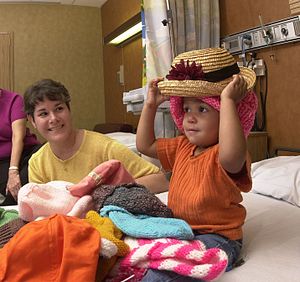
Pediatric oncology

Childhood cancer is cancer in a child. In the United States, an arbitrarily adopted standard of the ages used are 0–14 years inclusive, that is, up to 14 years 11.9 months of age. However, the definition of childhood cancer sometimes includes adolescents between 15–19 years old. Pediatric oncology is the branch of medicine concerned with the diagnosis and treatment of cancer in children. Childhood cancer is cancer in a child. In the United States, an arbitrarily adopted standard of the ages used are 0–14 years inclusive, that is, up to 14 years 11.9 months of age. However, the definition of childhood cancer sometimes includes adolescents between 15–19 years old. Pediatric oncology is the branch of medicine concerned with the diagnosis and treatment of cancer in children. Worldwide, it is estimated that childhood cancer has an incidence of more than 175,000 per year, and a mortality rate of approximately 96,000 per year. In developed countries, childhood cancer has a mortality of approximately 20% of cases. In low resource settings, on the other hand, mortality is approximately 80%, or even 90% in the world's poorest countries. In many developed countries the incidence is slowly increasing, as rates of childhood cancer increased by 0.6% per year between 1975 and 2002 in the United States and by 1.1% per year between 1978 and 1997 in Europe. Children with cancer are at risk for developing various cognitive or learning problems. These difficulties may be related to brain injury stemming from the cancer itself, such as a brain tumor or central nervous system metastasis or from side effects of cancer treatments such as chemotherapy and radiation therapy. Studies have shown that chemo and radiation therapies may damage brain white matter and disrupt brain activity. This cognitive problem is known as post-chemotherapy cognitive impairment (PCCI) or 'chemo brain.' This term is commonly use by cancer survivors who describe having thinking and memory problems after cancer treatment. Researchers are unsure what exactly causes chemo brain, however, they say it is likely to be linked to either the cancer itself, the cancer treatment, or be an emotional reaction to both. This cognitive impairment is commonly noticed a few years after a child endures cancer treatment. When a childhood cancer survivor goes back to school, they might experience lower test scores, problems with memory, attention, and behavior, as well as poor hand-eye coordination and slowed development over time. Parents can apply their children for special educational services at school if their cognitive learning disability affects their educational success. Familial and genetic factors are identified in 5-15% of childhood cancer cases. In <5-10% of cases, there are known environmental exposures and exogenous factors, such as prenatal exposure to tobacco, X-rays, or certain medications. For the remaining 75-90% of cases, however, the individual causes remain unknown. In most cases, as in carcinogenesis in general, the cancers are assumed to involve multiple risk factors and variables. Aspects that make the risk factors of childhood cancer different from those seen in adult cancers include: Also, a longer life expectancy in children avails for a longer time to manifest cancer processes with long latency periods, increasing the risk of developing some cancer types later in life. Advanced parental age has been associated with increased risk of childhood cancer in the offspring. There are preventable causes of childhood malignancy, such as delivery overuse and misuse of ionizing radiation through computed tomography scans when the test is not indicated or when adult protocols are used.
